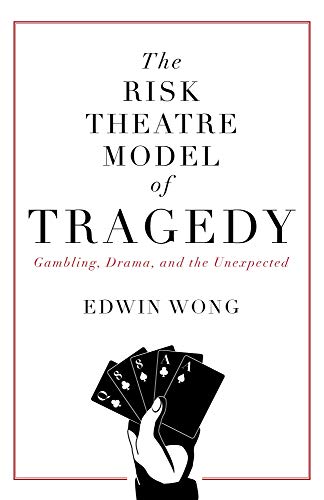THE RISK THEATRE MODEL OF TRAGEDY was the winner in the Writing/Publishing category of the 2020 IndieReader Discovery Awards, where undiscovered talent meets people with the power to make a difference.
Following find an interview with author Edwin Wong.
What is the name of the book and when was it published?
The name of the book is THE RISK THEATRE MODEL OF TRAGEDY and it was published in 2019 by Friesen Press.
What’s the book’s first line?
The book’s first line is: “Tragedy today is a tired art.”
What’s the book about? Give us the “pitch”.
The book presents a dynamic and exciting new theory of drama called “risk theatre.” In risk theatre, risk is the dramatic fulcrum of the action. Drama becomes a vehicle to explore the impact of the highly improbable. Through examples from Aeschylus to Eugene O’Neill, playwrights and students of theatre can learn how the art form of tragedy explores low-probability, high-consequence risk events.
What inspired you to write the book? A particular person? An event?
I’ve read all the theories of tragedy, but none of them made risk the dramatic fulcrum of the action. The idea that there are two types of drama because there are two types of risk came to me one day: tragedy explores downside risk while comedy explores upside risk. The idea seemed at once so simple and profound that I felt someone had to write a book about it.
What’s the most distinctive thing about the main character? Who-real or fictional-would you say the character reminds you of?
The most distinctive thing about my book is that it’s the first book on literary theory that anyone can read. Many people who have recently begun enjoying the theatre are writing in to say how the risk theatre perspective adds to their enjoyment and understanding of theatre. In this way, The Risk Theatre Model of Tragedy is literary theory’s finest moment: a hard core theory that is accessible to anyone.
What’s the main reason someone should really read this book?
People interested in how chance and uncertainty impacts life may be interested in this book. The book argues that the theatre is like a lab in which we dramatize risk so that we can better understand risk in life.
When did you first decide to become an author?
I first decided to become an author when I fell in love with reading in my teens. It took over thirty years, however, for me to publish my first book. It’s been a lifetime journey.
Is this the first you’ve written?
The Risk Theatre Model of Tragedy is my first book.
What do you do for work when you’re not writing?
I work in the construction industry as a project manager. Much of my job is involved with controlling, eliminating, or mitigating risks.
How much time do you generally spend on your writing?
Workdays, I’m lucky to get in a few hours of writing. Weekends I’ll be writing and reading a good half of the day.
What’s the best and the hardest part of being an indie?
The best part about being an indie is learning all the different parts of the game. You’re all-in with writing, promoting, and blogging. It’s up to you whether the project succeeds or fails. You have skin in the game and your feet in the fire.
What’s a great piece of advice that you can share with fellow indie authors?
A great piece of advice for fellow indie authors is this: go for it!
Would you go traditional if a publisher came calling? If so, why?
If a traditional published came calling, sure I’d give it a try. It’s good to keep an open mind to different experiences.
Is there something in particular that motivates you (fame? fortune?)
I’m motivated by the possibility of adding to the long conversation people have been having on literary theory. Plato started the conversation and people are still fascinated by the question: “Why do we enjoy tragedy’s sad stories so much?” today.
Which writer, living or dead, do you most admire?
I admire all the writers before me who have contributed to the theory of tragedy: Aristotle, Hegel, Nietzsche, and many others.
Which book do you wish you could have written?
The Risk Theatre Model of Tragedy is the book that I wish I could have written. It’s amazing reading it. It was a lucky 13 years in the writing, so reading it brings back a whole archaeology of memories. Where I was when I was writing certain passages. People who helped me out with ideas. The music I was listening to. So many memories. That must be one of the pleasures of writing that you don’t hear people talking about: writers are the only ones who can read their own books.

